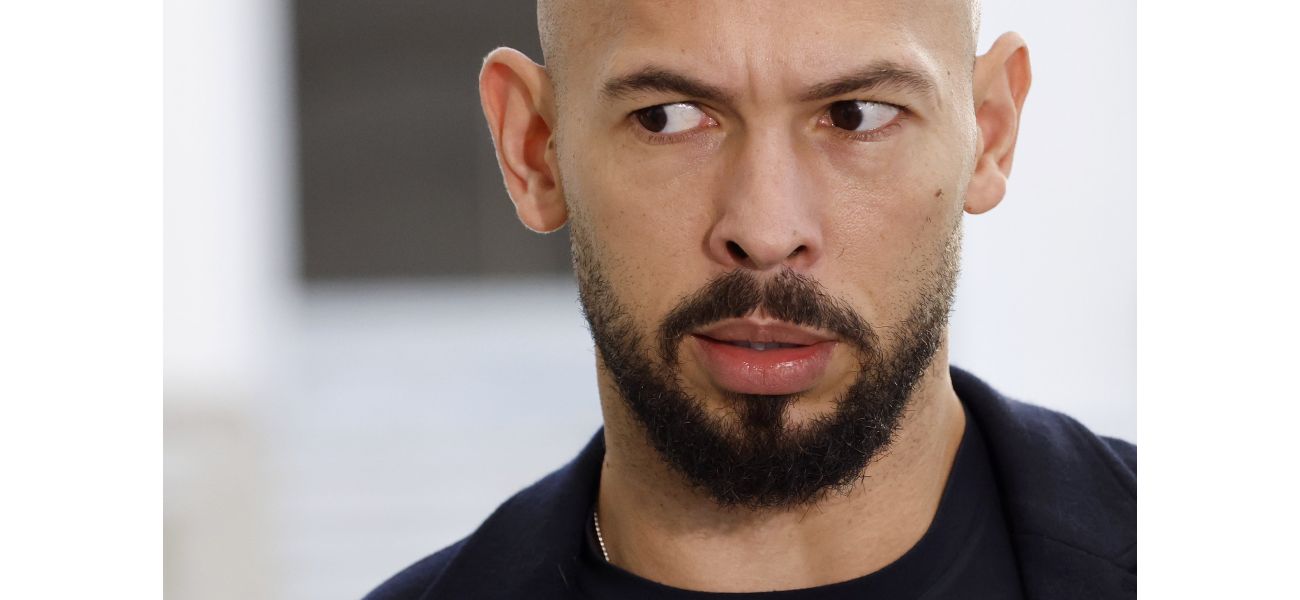Men are adopting misogyny - we must act.
Being a male role model is a lucrative industry.
January 10th 2025.

In 2022, I came across a self-proclaimed misogynist named Andrew Tate when his post about not reading books popped up on my social media feed. As an avid reader since childhood, I was taken aback by such a critical view on reading. However, I brushed it off as a provocative statement for views. Just a few months later, Tate was banned from various social media platforms like YouTube, TikTok, Facebook, and Instagram for promoting sexist, misogynistic, and violent attitudes towards women. And to top it all off, he was arrested in Romania in December 2022 on charges of rape, human trafficking, exploiting women, and sexual coercion. In addition, a civil claim in the UK successfully brought against him and his brother for tax evasion. It was shocking to see how someone who had initially captured my attention with a video about books could hide behind a far more dangerous account.
Many viewers would have been drawn to his page and engaged with more of his content, watching other videos where his attitudes towards women and masculinity became clear. This is what worries me and helps explain why so many young men have turned to him and been lured in by his extreme views. Sarah Beeny, a well-known personality, recently argued that "Eighty per cent of what [Tate] says is really brilliant. He says, "Put the shoulders back, get a six-pack and you won't be depressed," and you think, actually, that's good advice." But then, she points out, "slid in, is this moment of toxic, "And tell your bitch she should do as she's told." Her comments highlight how Tate's "good" advice can act as a Trojan horse, allowing his more concerning views to slip under the radar and subtly influence boys' and men's views about women, dating, and consensual relationships. In the most extreme cases, this can even lead to radicalization in a dangerous form of male supremacist ideology.
For young men who may be feeling insecure about their identities, some of Tate's advice may seem well-meaning or even aspirational. This gradual process of gaining trust through "low stakes" content can help normalize more extreme content down the line, as research has shown to be a typical pathway of radicalization. Tate also promotes the idea that men's rights are being undermined by feminism. This "zero-sum" thinking - that if women and girls are advancing, then it must be at the expense of men - is a common strategy in the manosphere, fueling resentment and anger towards women.
Who is Andrew Tate? A former kickboxer and social media influencer, born in Washington DC. Tate rose to fame in 2016 as a contestant on series 17 of Big Brother. The 36-year-old is notorious for his controversial behavior and misogynistic views, which have led to him being banned from several social media websites. He was arrested on December 29 in Romania as part of an ongoing human trafficking investigation. His case remains ongoing as of early 2025, and he is unable to leave the Balkan country.
As a professor in sociolinguistics, one of my focus areas includes language and masculinity, and the impact of Tate has been of interest to me as he has fully entered mainstream discourse. Drawn in by Tate's videos and interviews on how to make money, motivational speeches, and stories of overcoming bullying at school, it's understandable how young men might find an affinity with this "strong" male figure. His content also draws his fans into the manosphere, an online space for promoting sexism and misogyny where Tate's content has found a home. Here, he offers "life advice" to a receptive audience of boys and young men about relationships, dating, parenting, self-discipline, and more.
Tate joins other manosphere influencers such as Nicolas Balinthazy, Adin Ross, Joe Rogan, and Fresh & Fit hosts Myron Gaines and Walter Weekes. In his recent presidential campaign, Donald Trump appeared on interviews and podcasts with Rogan and Ross, bolstering his image as powerful and hypermasculine, which seems to have resonated with his electoral gains among men. Some men even go as far as to sign up for his Hustler's University course or pay for exclusive access to his "War Room," where they network with other men, share success stories, and supposedly learn the secrets of wealth creation.
A few years ago, Tate went viral in videos where he came across as more unintentionally comical than dangerous, such as one where he talks about how he would foil a terrorist attack by "grabbing the AK" or another where he claims anyone who has a heart attack is a "pussy." But his more extreme content is now an undeniable part of mainstream conversations, giving him a degree of legitimacy to some viewers. Academics in Australia interviewed female teachers and found increased rates of sexual harassment and misogyny in schools, with teachers claiming that Tate had skewed boys' understanding of social power dynamics. Similar findings have emerged in research in the UK, with boys seeing Tate as a reasonable and authentic voice, especially in relation to feminism and gender politics. This is clearly a cause for concern, and many journalists, educators, and academics are worried about the outsized influence he seems to be having on boys and young men worldwide.
Although the Romanian case against Tate remains ongoing as of early 2025, meaning he is unable to leave the Balkan country, this hasn't stopped him from being interviewed by the BBC and Piers Morgan, or regularly posting on social media about the UK summer riots and his plans to run for prime minister. Tate, for his part, hints at a conspiracy, claiming that he's the unjust victim of attacks by the mainstream media, that his comments have been edited or taken out of context, or that he's playing a character and it's all just a joke. That kind of "us against the world" thinking has garnered Tate a devoted army of followers who not only share and support his content but also attack those who might disagree. For example, after his interview with Piers Morgan in August 2024, YouTube comments were almost universally positive about his performance, while BBC journalist Matt Shea received death threats following the release of his documentary about Tate.
Many academics, teachers, educators, politicians, and parents have wrestled with how best to deal with Tate's influence. It's an ongoing issue that requires careful consideration and action, as his popularity and influence continue to grow.
In 2022, I stumbled upon Andrew Tate, a self-proclaimed misogynist, when a post of his about not reading books appeared on my social media feed. Being an avid reader since childhood, I was taken aback by his criticism of reading. However, I brushed it off as him trying to be provocative for views. Just a few months later, Tate was banned from major social media platforms like YouTube, TikTok, Facebook, and Instagram for promoting sexist, misogynistic, and violent attitudes towards women. And that's not all, he was also arrested in Romania in December 2022 on charges of rape, human trafficking, exploiting women, and sexual coercion. In the UK, he and his brother were successfully sued for tax evasion.
At first, Tate caught my attention with a video about books, but behind it was a more dangerous agenda. Many viewers were lured in by his content and ended up watching other videos where his true views on women and masculinity became clear. This is what worries me the most and explains why so many young men have been drawn to him and his extreme beliefs. As Sarah Beeny pointed out, his seemingly "good" advice can act as a Trojan horse, allowing his more concerning views to slip under the radar and subtly influence boys' and men's perspectives on women, dating, and consensual relationships. In some extreme cases, he has even radicalized them with his dangerous form of male supremacist ideology.
For young men who may be feeling insecure about their identities, Tate's advice may seem well-meaning or even aspirational. This gradual process of gaining trust through seemingly harmless content can eventually lead to the normalization of more extreme views, which research has shown to be a common pathway for radicalization. Tate also spreads the notion that men's rights are being undermined by feminism, a "zero-sum" thinking that fuels resentment and anger towards women. It's a tactic often used in the manosphere, an online community that promotes sexism and misogyny.
Andrew Tate, born in Washington DC, is a former kickboxer and social media influencer. He rose to fame in 2016 as a contestant on Big Brother. However, he is known for his controversial behavior and misogynistic views, which have resulted in his ban from various social media platforms. In December 2022, he was arrested in Romania as part of an ongoing human trafficking investigation. His influence has even caught the attention of a professor in sociolinguistics, who studies language and masculinity. Tate's content, ranging from making money to motivational speeches and stories of overcoming bullying, has attracted a large following, especially among young men who find an affinity with his "strong" male persona.
Tate's content also draws his fans into the manosphere, a space for promoting sexism and misogyny. Here, he offers "life advice" to a receptive audience about relationships, dating, parenting, self-discipline, and more. He joins other influencers in this space, such as Nicolas Balinthazy, Adin Ross, Joe Rogan, and Fresh & Fit hosts Myron Gaines and Walter Weekes. In his presidential campaign, Donald Trump appeared on interviews and podcasts with some of these influencers, boosting his image as a powerful and hypermasculine figure, which resonated with his male supporters. Some men have even signed up for Tate's Hustler's University course or paid for exclusive access to his "War Room", where they network with other men and supposedly learn the secrets of wealth creation.
However, alongside this seemingly harmless content, Tate also promotes a misogynistic attitude towards women. In past interviews and podcasts, he has made derogatory comments about women, such as comparing them to babies and calling them a man's property. Investigations have also uncovered chat logs from his "War Room" where men discuss tactics for grooming women for sex work and exploiting potential victims. Sadly, Tate's popularity cannot be underestimated. Surveys show that a significant number of young men hold positive views of him and agree with his beliefs about women and masculinity. Although some of his content may seem comical, it has now become an undeniable part of mainstream conversations, giving him a degree of legitimacy in the eyes of some viewers.
Tate's influence has also been felt in schools, with teachers reporting increased rates of sexual harassment and misogyny among students. They believe that Tate's content has skewed boys' understanding of social power dynamics. This is a cause for concern, and many journalists, educators, and academics have expressed their worries about his impact on young men. Although he is currently unable to leave Romania due to his ongoing legal case, Tate continues to be interviewed by major media outlets and post on social media about his plans to run for prime minister in the UK. He often hints at a conspiracy, claiming to be a victim of attacks by the mainstream media and downplaying his controversial comments as jokes.
This kind of "us against the world" mentality has earned Tate a devoted army of followers who not only support his content but also attack anyone who disagrees with him. For instance, after his interview with Piers Morgan in 2024, the majority of comments on his YouTube video were positive, while the journalist received death threats following his documentary on Tate. Academics, teachers, educators, politicians, and parents are all grappling with how to address Tate's influence on young men. It's a pressing issue that cannot be ignored.
Many viewers would have been drawn to his page and engaged with more of his content, watching other videos where his attitudes towards women and masculinity became clear. This is what worries me and helps explain why so many young men have turned to him and been lured in by his extreme views. Sarah Beeny, a well-known personality, recently argued that "Eighty per cent of what [Tate] says is really brilliant. He says, "Put the shoulders back, get a six-pack and you won't be depressed," and you think, actually, that's good advice." But then, she points out, "slid in, is this moment of toxic, "And tell your bitch she should do as she's told." Her comments highlight how Tate's "good" advice can act as a Trojan horse, allowing his more concerning views to slip under the radar and subtly influence boys' and men's views about women, dating, and consensual relationships. In the most extreme cases, this can even lead to radicalization in a dangerous form of male supremacist ideology.
For young men who may be feeling insecure about their identities, some of Tate's advice may seem well-meaning or even aspirational. This gradual process of gaining trust through "low stakes" content can help normalize more extreme content down the line, as research has shown to be a typical pathway of radicalization. Tate also promotes the idea that men's rights are being undermined by feminism. This "zero-sum" thinking - that if women and girls are advancing, then it must be at the expense of men - is a common strategy in the manosphere, fueling resentment and anger towards women.
Who is Andrew Tate? A former kickboxer and social media influencer, born in Washington DC. Tate rose to fame in 2016 as a contestant on series 17 of Big Brother. The 36-year-old is notorious for his controversial behavior and misogynistic views, which have led to him being banned from several social media websites. He was arrested on December 29 in Romania as part of an ongoing human trafficking investigation. His case remains ongoing as of early 2025, and he is unable to leave the Balkan country.
As a professor in sociolinguistics, one of my focus areas includes language and masculinity, and the impact of Tate has been of interest to me as he has fully entered mainstream discourse. Drawn in by Tate's videos and interviews on how to make money, motivational speeches, and stories of overcoming bullying at school, it's understandable how young men might find an affinity with this "strong" male figure. His content also draws his fans into the manosphere, an online space for promoting sexism and misogyny where Tate's content has found a home. Here, he offers "life advice" to a receptive audience of boys and young men about relationships, dating, parenting, self-discipline, and more.
Tate joins other manosphere influencers such as Nicolas Balinthazy, Adin Ross, Joe Rogan, and Fresh & Fit hosts Myron Gaines and Walter Weekes. In his recent presidential campaign, Donald Trump appeared on interviews and podcasts with Rogan and Ross, bolstering his image as powerful and hypermasculine, which seems to have resonated with his electoral gains among men. Some men even go as far as to sign up for his Hustler's University course or pay for exclusive access to his "War Room," where they network with other men, share success stories, and supposedly learn the secrets of wealth creation.
A few years ago, Tate went viral in videos where he came across as more unintentionally comical than dangerous, such as one where he talks about how he would foil a terrorist attack by "grabbing the AK" or another where he claims anyone who has a heart attack is a "pussy." But his more extreme content is now an undeniable part of mainstream conversations, giving him a degree of legitimacy to some viewers. Academics in Australia interviewed female teachers and found increased rates of sexual harassment and misogyny in schools, with teachers claiming that Tate had skewed boys' understanding of social power dynamics. Similar findings have emerged in research in the UK, with boys seeing Tate as a reasonable and authentic voice, especially in relation to feminism and gender politics. This is clearly a cause for concern, and many journalists, educators, and academics are worried about the outsized influence he seems to be having on boys and young men worldwide.
Although the Romanian case against Tate remains ongoing as of early 2025, meaning he is unable to leave the Balkan country, this hasn't stopped him from being interviewed by the BBC and Piers Morgan, or regularly posting on social media about the UK summer riots and his plans to run for prime minister. Tate, for his part, hints at a conspiracy, claiming that he's the unjust victim of attacks by the mainstream media, that his comments have been edited or taken out of context, or that he's playing a character and it's all just a joke. That kind of "us against the world" thinking has garnered Tate a devoted army of followers who not only share and support his content but also attack those who might disagree. For example, after his interview with Piers Morgan in August 2024, YouTube comments were almost universally positive about his performance, while BBC journalist Matt Shea received death threats following the release of his documentary about Tate.
Many academics, teachers, educators, politicians, and parents have wrestled with how best to deal with Tate's influence. It's an ongoing issue that requires careful consideration and action, as his popularity and influence continue to grow.
In 2022, I stumbled upon Andrew Tate, a self-proclaimed misogynist, when a post of his about not reading books appeared on my social media feed. Being an avid reader since childhood, I was taken aback by his criticism of reading. However, I brushed it off as him trying to be provocative for views. Just a few months later, Tate was banned from major social media platforms like YouTube, TikTok, Facebook, and Instagram for promoting sexist, misogynistic, and violent attitudes towards women. And that's not all, he was also arrested in Romania in December 2022 on charges of rape, human trafficking, exploiting women, and sexual coercion. In the UK, he and his brother were successfully sued for tax evasion.
At first, Tate caught my attention with a video about books, but behind it was a more dangerous agenda. Many viewers were lured in by his content and ended up watching other videos where his true views on women and masculinity became clear. This is what worries me the most and explains why so many young men have been drawn to him and his extreme beliefs. As Sarah Beeny pointed out, his seemingly "good" advice can act as a Trojan horse, allowing his more concerning views to slip under the radar and subtly influence boys' and men's perspectives on women, dating, and consensual relationships. In some extreme cases, he has even radicalized them with his dangerous form of male supremacist ideology.
For young men who may be feeling insecure about their identities, Tate's advice may seem well-meaning or even aspirational. This gradual process of gaining trust through seemingly harmless content can eventually lead to the normalization of more extreme views, which research has shown to be a common pathway for radicalization. Tate also spreads the notion that men's rights are being undermined by feminism, a "zero-sum" thinking that fuels resentment and anger towards women. It's a tactic often used in the manosphere, an online community that promotes sexism and misogyny.
Andrew Tate, born in Washington DC, is a former kickboxer and social media influencer. He rose to fame in 2016 as a contestant on Big Brother. However, he is known for his controversial behavior and misogynistic views, which have resulted in his ban from various social media platforms. In December 2022, he was arrested in Romania as part of an ongoing human trafficking investigation. His influence has even caught the attention of a professor in sociolinguistics, who studies language and masculinity. Tate's content, ranging from making money to motivational speeches and stories of overcoming bullying, has attracted a large following, especially among young men who find an affinity with his "strong" male persona.
Tate's content also draws his fans into the manosphere, a space for promoting sexism and misogyny. Here, he offers "life advice" to a receptive audience about relationships, dating, parenting, self-discipline, and more. He joins other influencers in this space, such as Nicolas Balinthazy, Adin Ross, Joe Rogan, and Fresh & Fit hosts Myron Gaines and Walter Weekes. In his presidential campaign, Donald Trump appeared on interviews and podcasts with some of these influencers, boosting his image as a powerful and hypermasculine figure, which resonated with his male supporters. Some men have even signed up for Tate's Hustler's University course or paid for exclusive access to his "War Room", where they network with other men and supposedly learn the secrets of wealth creation.
However, alongside this seemingly harmless content, Tate also promotes a misogynistic attitude towards women. In past interviews and podcasts, he has made derogatory comments about women, such as comparing them to babies and calling them a man's property. Investigations have also uncovered chat logs from his "War Room" where men discuss tactics for grooming women for sex work and exploiting potential victims. Sadly, Tate's popularity cannot be underestimated. Surveys show that a significant number of young men hold positive views of him and agree with his beliefs about women and masculinity. Although some of his content may seem comical, it has now become an undeniable part of mainstream conversations, giving him a degree of legitimacy in the eyes of some viewers.
Tate's influence has also been felt in schools, with teachers reporting increased rates of sexual harassment and misogyny among students. They believe that Tate's content has skewed boys' understanding of social power dynamics. This is a cause for concern, and many journalists, educators, and academics have expressed their worries about his impact on young men. Although he is currently unable to leave Romania due to his ongoing legal case, Tate continues to be interviewed by major media outlets and post on social media about his plans to run for prime minister in the UK. He often hints at a conspiracy, claiming to be a victim of attacks by the mainstream media and downplaying his controversial comments as jokes.
This kind of "us against the world" mentality has earned Tate a devoted army of followers who not only support his content but also attack anyone who disagrees with him. For instance, after his interview with Piers Morgan in 2024, the majority of comments on his YouTube video were positive, while the journalist received death threats following his documentary on Tate. Academics, teachers, educators, politicians, and parents are all grappling with how to address Tate's influence on young men. It's a pressing issue that cannot be ignored.
[This article has been trending online recently and has been generated with AI. Your feed is customized.]
[Generative AI is experimental.]
0
0
Submit Comment





